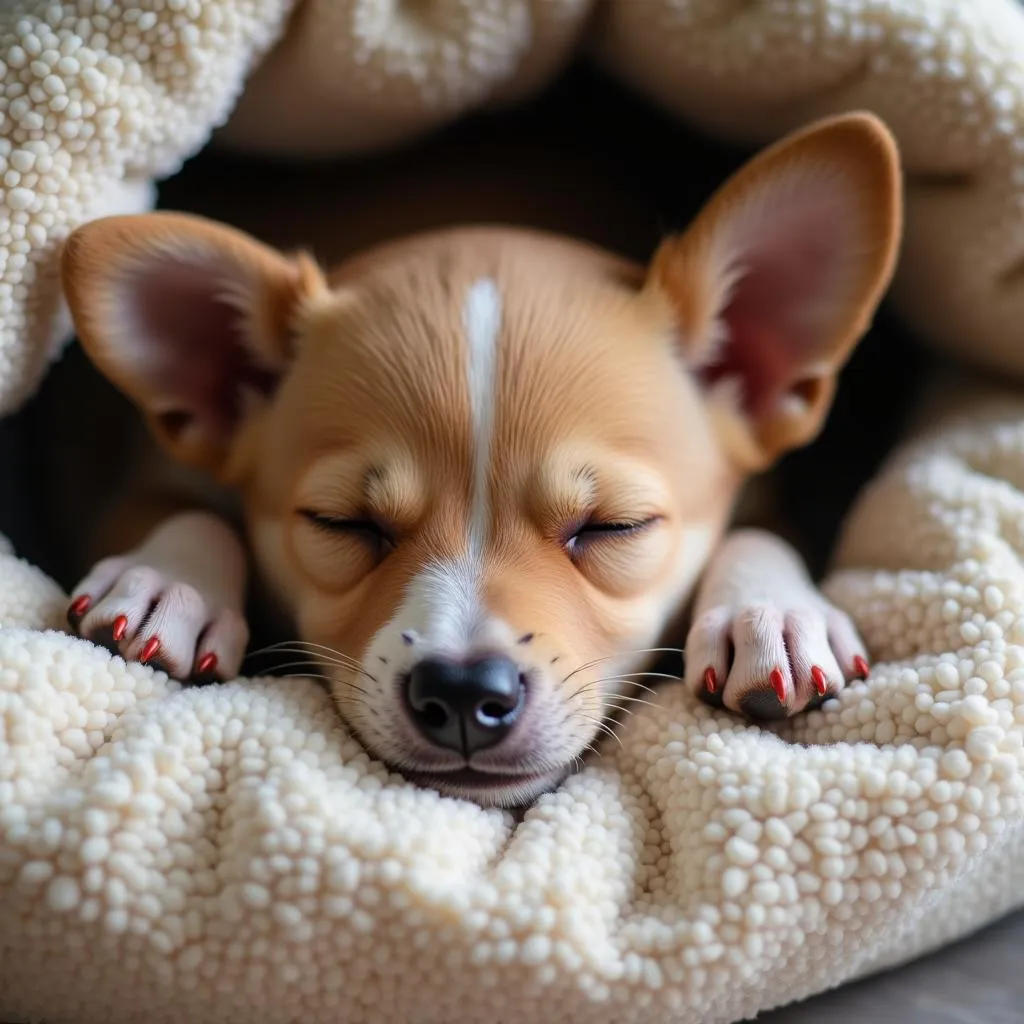“Con chó con ngủ ngon, như bông, như bướm”, a Vietnamese proverb often used to describe the peaceful slumber of a puppy. But what happens when that peaceful slumber turns into a symphony of barks, howls, and whines throughout the night? Many pet owners, especially those with little dogs, face the challenge of a restless pup who prefers to “rhapsody” in the night. This article will explore the common reasons behind this behavior and provide some helpful tips for creating a peaceful sleep environment for both you and your furry friend.
Why Do Little Dogs Bark at Night?
Age and Development
Just like human babies, young puppies have a tendency to wake up frequently during the night. They’re still learning to control their bladders and bowels, and they might need to go potty more often. This can be especially true for smaller breeds, who have smaller bladders.
“It’s important to remember that puppies are still learning the ropes”, says Dr. Mai, a renowned veterinarian in Hanoi. “They need time to develop their sleep patterns and learn to self-soothe.”
Separation Anxiety
Little dogs, especially those with strong bonds with their owners, often struggle with separation anxiety. They may become distressed when left alone at night, leading to barking, howling, or pacing.
Boredom and Lack of Exercise
A tired dog is a sleepy dog! If your little pup isn’t getting enough exercise during the day, they may be restless and have pent-up energy they need to release at night.
Medical Issues
While it’s not always the case, nighttime barking can sometimes be a sign of an underlying medical condition. For example, a dog with arthritis may experience pain that worsens at night, leading to whimpering or restlessness.
What Can You Do?
Create a Consistent Routine
Establishing a predictable sleep schedule for your puppy is crucial. Start by feeding them at the same time each day, taking them for walks or playtime, and putting them to bed in their crate or bed at a consistent hour.
Gradual Crate Training
Crate training is a great way to help your puppy feel secure and comfortable at night. It’s important to introduce the crate gradually and positively, making it a safe and enjoyable space for your pup.
Provide Mental Stimulation
Keep your little dog’s mind engaged throughout the day with puzzles, interactive toys, and training sessions. This will help tire them out both physically and mentally, making them more likely to sleep soundly at night.
Consider a White Noise Machine
Some dogs find white noise soothing and calming, helping to block out distractions and promote relaxation. You can use a white noise machine, fan, or even play calming music for your pup.
Tips for Creating a Peaceful Sleep Environment
- Make sure your dog has a comfortable and secure bed or crate in a quiet area of the house.
- Avoid feeding your dog late at night, as this can lead to restlessness and bathroom breaks.
- Consider using calming supplements or pheromone diffusers to help your dog relax.
When to Seek Professional Help
If you’ve tried everything and your little dog continues to bark excessively at night, consult with your veterinarian. They can rule out any underlying medical conditions and offer additional advice.
A True Story
Once upon a time, a tiny chihuahua named Coco was known for his nightly serenades. His owner, Ms. Mai, was constantly exhausted from being woken up at all hours of the night. She tried everything – crate training, a consistent schedule, and even calming music. Nothing seemed to work! Finally, she consulted with Dr. Nguyen, a renowned veterinary behaviorist. It turned out Coco was afraid of the dark and was using barking as a way to comfort himself. Dr. Nguyen suggested using a nightlight and a small, soft toy in Coco’s crate, and to her relief, the barking stopped!
** Little dog sleeping soundly in a cozy bed
Little dog sleeping soundly in a cozy bed
Conclusion
“Little Dogs Rhapsody in the Night” is a common occurrence, but it doesn’t have to be a constant struggle. By understanding the reasons behind your pup’s nocturnal habits and implementing the tips above, you can create a peaceful sleep environment for both you and your furry friend. Remember, patience and consistency are key to establishing good sleep habits in your puppy. If you’re still struggling, don’t hesitate to seek professional help. You can also visit our website for more information on hot dog cart supplies, which might be useful for those who are looking to start their own pet businesses.
For additional support, contact our customer service team at 0372960696 or email us at [email protected]. We’re here to help you and your furry friend navigate the journey of pet ownership.
Leave a Reply
You must be logged in to post a comment.